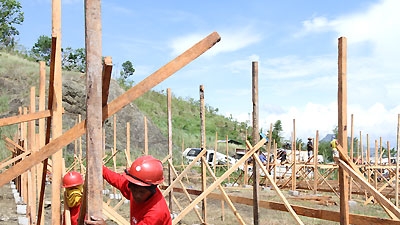Honorable Secretary Soliman…., Ladies and Gentlemen,
Good morning and welcome to Manila and to this conference on Strengthening Social Protection Systems to Manage Disaster and Climate Risk in Asia and the Pacific.
The World Bank is honored to jointly host this conference, with the Philippines’ lead social protection agency, the Department of Social Welfare and Development. This Conference is a great opportunity to share knowledge and experience on how countries cope with one of the greatest challenges in human existence: the climate change and related environment disasters, and also share knowledge and experience on the role of social protection not only in dealing with aftermath of disasters , but also in adapting to climate change and decreasing the risk to disaster. You will hear in the next three days the experiences of 17 countries from three continents --- Cambodia, Mongolia, Vietnam, Myanmar, Timor Leste, Papua New Guinea, Sri Lanka, Ethiopia, Bangladesh, El Salvador, Panama, Indonesia, India, Nepal, Fiji, Kenya and the Philippines.
All of us are gathered in this hall because we care deeply about the impacts of climate change on our lives and well-being now and in the future. The Philippines is one great example of how one extreme weather event such as typhoon Yolanda, experienced a year ago, can disrupt lives of millions of people, wipe out livelihoods and throw many into poverty overnight. Super Typhoon Yolanda was indeed super! It was recorded to be among the strongest typhoons to ever make landfall, with over 8,000 casualties and close to 200 severely affected municipalities. About 3 million households with almost 13.5 million members were affected directly. Half a million houses were destroyed and another half a million damaged. The total damage and loss has been estimated at almost 13.0 billion USD. The loss of jobs, livelihood, houses and productive assets immediately pushed about half a million people into poverty, while those that were already poor, were pushed deeper into poverty and many into destitution. This corresponds to an increase in the poverty rate by 35.0 percent, in an area where poverty was already significantly above the national average.
The Philippines has unfortunately been forced to accumulate a lot of experience in dealing with disasters. It is among the world’s countries most vulnerable to environmental disasters. Every year, it experiences strong typhoons and floods. Furthermore, it is prone to earthquakes and volcano eruptions. In response, it has put together a solid system for disaster risk management. However, the unprecedented strength and devastation caused by Yolanda put the Philippines’ Disaster Risk Management system under tremendous stress and test. One government Secretary described Yolanda as a “wake up call” – the Government thought that it already had an adequate DRRM system in place. This was certainly true for small and moderate size disasters, but not for the magnitude of disasters like Yolanda that has brought to the fore existing institutional weaknesses.
Typhoon Yolanda also warned all of us, including those from other countries, that this could be the “new normal” where disasters of tremendous strength might become common. In response, the Government of the Philippines has been rethinking the institutional framework to effectively deal with large-scale disasters. There may be a valid justification for formalizing the management of disasters through a dedicated, permanent government institution, which would be the appropriate authority to coordinate and manage the recovery from such high-impact events. This entity would not replace the existing line agencies of the government, but would be in charge of two important functions: 1) distributing and monitoring the additional funds required for disaster recovery; and 2) undertaking prevention and risk reduction to reduce losses in the long term.
Yolanda recovery also highlights the global debate on how to define recovery. Many have expressed that response, recovery and development should be thought of as overlapping processes instead of distinct steps. These terms and definitions affect every process of recovery, from response, to planning, to financing, to implementation, to monitoring.
A good example of this integrated approach is linking the post-disaster housing needs with the recovery of livelihoods. Social development needs to link housing with livelihood and basic services and should be delivered as a comprehensive intervention.
Each time the disaster hits, the Department of Social Welfare and Development is the first to hit the ground. Secretary Dinky Soliman, a disaster response veteran, is going to tell you much more about the Philippines experience in making the social protection resilient to disaster, while ensuring that it responds rapidly to the consequences of disasters to help affected population recover as soon as possible. What I would like to emphasize is that DSWD is converging its three flagship programs - a conditional cash transfer program, a Community Driven Development program and a livelihood support program, and making the three flagship programs disaster sensitive, so that they are becoming an effective tool in making households more resilient to disasters. What we have also learned from DSWD experience is that having well-designed and implemented set of integrated social protection programs, as well as a capable and well run organizational infrastructure that delivers programs is crucially important for disaster risk management and response.
Finally, before I close, I would like to note, that managing climate change, environment and disaster risk is one of the five key areas of engagement of the World Bank’s Philippines Country Partnership Strategy 2014-2018. In this way, we recognize that managing disaster risk is one of the key contributing factors to achieving poverty reduction and shared prosperity goals to which the Philippines government and the World Bank are firmly committed.
I wish you a successful Conference. Thank you.
And as Filipinos say to their guests, MABUHAY!

